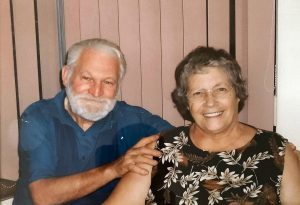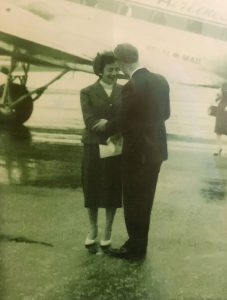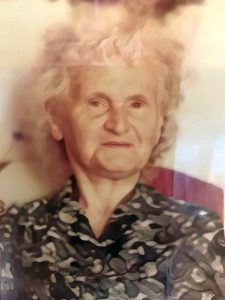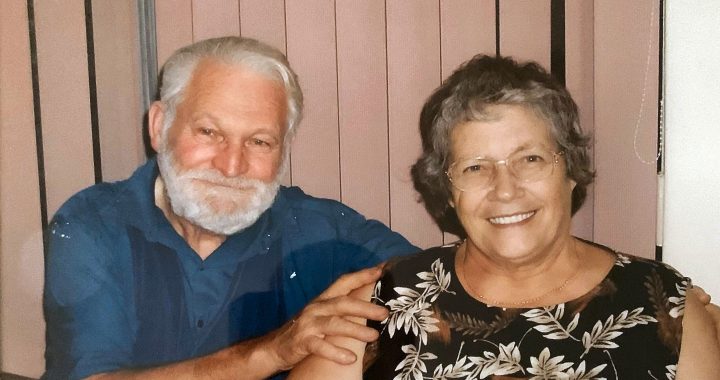I first met Ernie Klassek on July 14, 2016, in Perth, Australia, during an unforgettable visit to Western Australia in the middle of winter. Our journey took us to various churches in Australia and Singapore. The acquaintance with Ernie Klassek and his family left a lasting impression on us. His life of devout faithfulness to God serves as an example to us all. Bev and I were deeply moved by his faith, warmth, and friendliness. Since then, we have corresponded regularly. Ernie has shared his life and thoughts with me through his letters, inspiring me to compile his remarkable story. This series will present his narrative in his own words. So, here is the first installment!
A brief outline of Ernie’s life:
Ernie was born in a village between mountain ranges in Austria, in 1931, during the Great Depression. When his parents heard that there were work opportunities in Germany, they moved to Berlin.

Ernie and Domna in their retirement years in Western Australia
Ernie remembered Kindergarten, then primary school at age six. He also remembered his mother saying in 1938, when food ration coupons were introduced, ‘Oh no, not another war’. She recalled the food shortages in Austria during the First World War. Sure enough, the Second World War broke out in 1939.
When night bombing of residential areas of Berlin increased in 1940, they moved to Bamberg, a sleepy little city in southern Germany.
Ernie went to high school at age 10. English became his favourite subject.
Ernie was 12 when his little brother was born. He died from malnutrition at 15 months, not long after the Americans arrived, in April 1945. He was pure in heart - Matthew 5:8.
Even before the end of the war, Ernie and a friend, a mere ten days younger, had started to make string puppets and build a puppet theatre in a large attic, and when the Americans used all schools as field hospitals for their wounded soldiers, there was no school for more than a year and Ernie and his friend put on string puppet shows for neighbourhood kids, free. Money had become almost worthless after thewar; people survived on a barter system, officially called Black Market.
In 1948, the Klasseks returned to Austria. Ernie completed his last year in high school, then went to work on a farm because there was plenty of food.
Up there in the hills out of town was a paradise, no tractor or other machinery, only two horses to do much of the work with. The farmer and his wife wanted Ernie to stay for the rest of his life, but his parents insisted that he learn a trade at least.
The only apprenticeship available in town was at a small tailor shop. At the end of three years, Ernie received his trade certificate, but when his dad told him about a job as translator at a British Army depot near the border with Italy, Ernie applied and started the next day. Almost two years later, in 1954, the British returned to England, and Ernie was unemployed. Just as well, because, when he applied to go to Australia, and penniless, he was eligible for a free passage on a migrant ship.

This is my dear Domna and me meeting at the Wynyard airport in northern Tasmania for the first time - we were married about 20 minutes later.
The Norwegian passenger liner ‘Skaubryn’ sailed from Bremerhaven in north-west Germany with about 1000 Germans and a few Austrians and Yugoslavs in late June, and arrived at Fremantle on the 27th July. In contrast to their port of departure, there was neither fence nor gate, neither police nor customs. Ernie went ashore with two Austrians. People in town were very friendly, the sun was shining and when Ernie commented about the warm weather to a lady, she said,’ this is our winter’.
Next, they sailed to Melbourne and most boarded a train to a migrant camp called Bonegilla in north-eastern Victoria. After a fortnight, Ernie went to Sydney on an overnight train, then by taxi to a migrant hostel in South Cronulla, all free.
A year working in the Sydney area, then, in 1955, to the Burnie district in north-west Tasmania, to be Ernie’s home for 36 years. His parents arrived in 1957; together, they bought a weatherboard cottage on a ¾ acre block in the bush at Elliott.
Ernie corresponded with Domna in Greece for about two years. They met for the first time when she stepped off a plane at a small airport in north-west Tasmania. They were married 20 minutes later. It was the 4th of November, Melbourne Cup day, 1958, and Ernie backed a winner, because Domna turned out to be a Proverbs 31 woman [Proverbs 31:10-31]. They had a wonderful 51 years together. God blessed them with 2 sons, 3 daughters and eventually 16 grandchildren as well as 21 great-grandchildren – so far.
When Ernie was naturalised an Australian citizen in 1959, Bibles were handed out to all candidates. It was the first time Ernie held a Bible in his hand. His parents believed in God, but they had kept him out of religious instruction classes at school, so he welcomed the chance to find out for himself what this book was all about.
Ernie started as a clerk on the Burnie waterfront in 1960. Some wharfies gave him a magazine called The Plain Truth. Ernie was impressed with what he read and soon got his own subscription, free, from a Post Office Box 345, North Sydney, New South Wales, and also every booklet he could get hold of.
1962 might well be called the beginning of Ernie’s calling by God, as he never hesitated to keep the weekly biblical Sabbath and began sending tithes and offerings. God kept His promises in Malachi 3:10; Ernie never had a mortgage and paid cash for everything else he ever bought. He also slotted the annual Sabbaths into two sections of his annual leave, one in the autumn and one in the spring. Pentecost he just took the day off work.
Ernie’s dad died in 1963, at age 65. His had been a life of hard work and not much sleep. He taught Ernie many valuable lessons and principles. His loved ones look forward to a reunion with him at the time of his resurrection; after all, he was the patriarch of one branch of the Klassek clan to settle in Australia.
When Ernie bought Domna a Greek Bible she could see for herself why he did what he was doing. After six years following God’s way as a family – and assuming they were the only one on the island - Ernie enquired about a possible visit.
A minister, his wife and their little girl came on the 12th of January 1969. When the minister and Ernie had gone through doctrine after doctrine at length, and Ernie mentioned baptism, the minister said, ‘you’ve got nothing to unlearn – I’ll baptize you’.
It was one of those exceptionally beautiful Tasmanian summer’s days. Ernie with his family in front, followed by the minister with his wife and child, they drove to the little farm at Elliott. The minister waded into the dam down in the gully in his waders, Ernie in an old pair of trousers and a shirt. As Ernie came up out of the water and they were still standing waist deep, the minister laid his hands on Ernie’s head and prayed. It was one of Ernie’s most momentous, unforgettable days.
Not long after, the shipping companies were alerted to the fact that Ernie had taken Friday evening and Saturday shifts off for years; so – for more than two decades - they made every effort to get rid of him. Yet they were unsuccessful every time. Apparently God wanted Ernie to still work on the waterfront even after all the shipping companies’ bosses of that era had either retired or died.
The last Sabbath in June 1969 was a first: a Sabbath service for the scattered brethren from all over the island, at the Windmill Hill hall in Launceston, with an attendance of 117. The little grey hymnbooks had Radio Church of God on the front cover. From that time on, Sabbath services were held once a month with a minister from Melbourne. The same year, Domna, and Ernie’s mother, affectionately known as Granny Klassek, were baptized during the Feast of Tabernacles in Blackheath, New South Wales.
Eventually the Tasmanian Church grew to 260, with weekly services in Hobart, Launceston and Devonport. Burnie had a congregation of 63, with fortnightly services for 3 1/2 years, ultimately to be amalgamated with Devonport.
There were opportunities to serve galore: Hall set-up and clean-up, song-leading, sermonettes, also finding suitable sites at newsagents and airports for servicing news-stands for The Plain Truth.

My beloved mother.
Ernie’s mother went to her rest, awaiting the resurrection, in 1987, in her 82nd year. The family and the brethren look forward to catching up with her again. She was such a loving and gentle soul.
In the early 1990s - at the end of 32 years on the waterfront – Ernie took retirement when midnight shifts were introduced in Tasmania. Domna and Ernie moved to Western Australia to be near most of their children and grandchildren.
Enrolled as a private student with the Perth College of Divinity in 1993, Ernie completed the New Testament Greek course at Murdoch University with high distinction.
There were two Churches in Perth, north and south of the river, also congregations in Rockingham, Bunbury, Albany and Merredin. Geraldton was referred to as Bible Study.
Ernie and his extended family attended the Church of 360 south of the river.
Following a lengthy, strange sermon video in January 1995, numbers dwindled considerably. A questionnaire was handed out to the remnant: ‘Do you wish to continue with weekly and annual Sabbaths, adherence to the laws of clean and unclean meats etc, Yes or No?’ - or words to that effect. The result was a 98% Yes. So, Ernie and his clan stayed – until the 2% Nos eventually took over.
In time, the Klasseks were led to a United Church of God congregation. It was like a breath of fresh air; here was a part of an international Church that proclaims the Gospel of the Kingdom of God and the teachings of Jesus Christ as well as His prophecies, in a number of languages to all continents through several media and also publishing a free magazine called Beyond Today, plus a wide range of Bible-based booklets, all freely available for the asking.
Domna suffered a stroke in 2006. After three months in Fremantle hospital, she spent three years in a nursing home. She passed away in the early morning hours of the 6th of December 2009 – the day after she turned 77 *. She is fondly remembered as a sincere, humble lady. Asleep until the Resurrection.
* She was born on the 5th of December 1932. The date in her passport, the 14th of June 1933, is the day of her christening at the Greek Orthodox church in Nea Mihaniona, Greece [it is customary to immerse infants, and at the same time also to give them names

